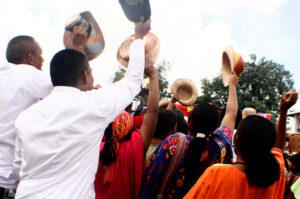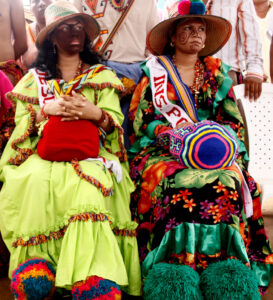The wisdom of the Wayuu greeting by Wayuumarket
 We anticipated that this plague would reach the territory of the Great Wayuu Nation at any moment. As a result, we prepared for it by offering drinks, baths, and herbal incense made from medicinal plants such as maluwa, alouka, and samüttapain. These wise beings from the Second Generation of Wunuu life, the plant beings, were the result of the union between two great geniuses or Pülashii, Mma, Mother Earth, and Juya, the rain. The Third Generation consisted of the Wüchii, the animal beings, and we, the Wayuu greeting, were the Fourth Generation, the human beings.
We anticipated that this plague would reach the territory of the Great Wayuu Nation at any moment. As a result, we prepared for it by offering drinks, baths, and herbal incense made from medicinal plants such as maluwa, alouka, and samüttapain. These wise beings from the Second Generation of Wunuu life, the plant beings, were the result of the union between two great geniuses or Pülashii, Mma, Mother Earth, and Juya, the rain. The Third Generation consisted of the Wüchii, the animal beings, and we, the Wayuu greeting, were the Fourth Generation, the human beings.
Furthermore, our lineage prepared itself through the yonna dance, performed at night under the flickering light of bonfires, followed by seclusions. These rituals took place in Ishamana, the community of the Epinayu ei’ruku.
Despite explaining the rituals and the necessary plants for their execution, my great-grandmother chose not to participate in any of them. Instead, she decided to remain secluded in her ranch, isolated from everyone else. Being the eldest woman in the entire territory, nobody knew her exact age, not even my mother and grandmother.
Despite her identification document stating her year of birth as 1920, indicating that she would be a hundred years old, she considered it to be an approximate number. She claimed to have witnessed over a hundred and ten rainy seasons, which she believed to be a more accurate measure of her age.
In the past, our elders used to calculate their age based on the rainy seasons they had witnessed. However, this practice ceased when the first civil registrations of the Wayuu people began. As it was no longer necessary to rely on this calculation to determine one’s age.
 In the times of old, the wayuu people
In the times of old, the wayuu people
She never permitted anyone to touch her, not even her grandchildren, not even for a greeting. When we questioned her about her reluctance, she would convey that such was the Wayuu way in ancient times: women would merely raise their hand slightly and utter the words of greeting, whereas men would simply speak the words, refraining from mentioning the visitor’s name as a matter of courtesy. Greetings bear immense significance in Wayuu culture.
That’s the story our grandmother used to narrate from her ranch. She reminded us that hosts were the first to greet those who arrived for a visit, but we no longer do that; we only imitate and speak like the alijuna. Nowadays, our greetings are with handshakes or kisses.
Our elders, those who still survive like my grandmother, slightly lean forward and do not allow themselves to be touched. The reason they managed to survive the Spanish flu was due to their adherence to those customs. Smallpox, and cholera, and I believe they will also survive this great plague, as we have lost that wisdom.
Glossary
Alouka: Wayuu medicinal plant.
Juya: Rain.
Maluwa: Wayuu medicinal plant.
Mma: Mother Earth.
Samüttapain: Wayuu medicinal plant.
Pülashii: Great geniuses, natural phenomena, the first generation of Wayuu life.
Wayuu: Indigenous people with settlements in La Guajira department (Colombia) and Zulia state (Venezuela).
Wüchii: Animal kingdom, the third generation of Wayuu life.
Wunnu: Plant kingdom, the second generation of Wayuu life.
Yonna: Wayuu dance.
Escrito por: Juan Manuel Gómez Cotes.
